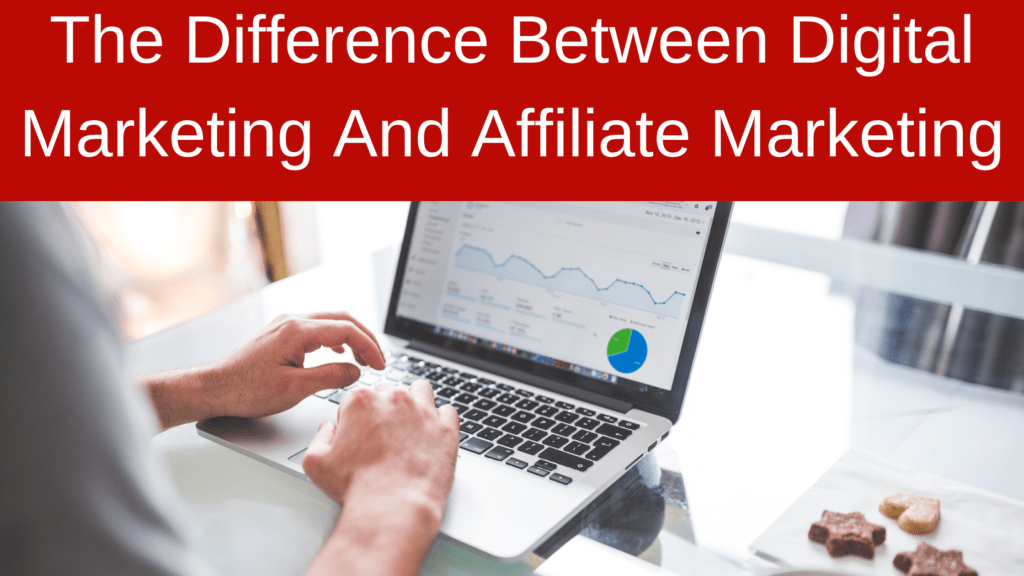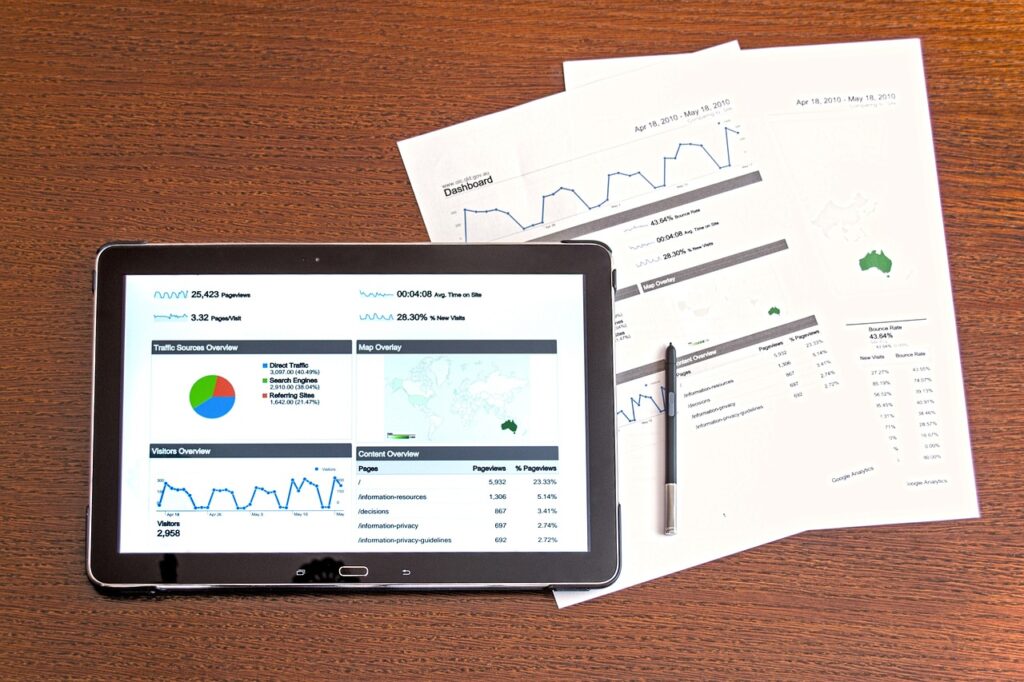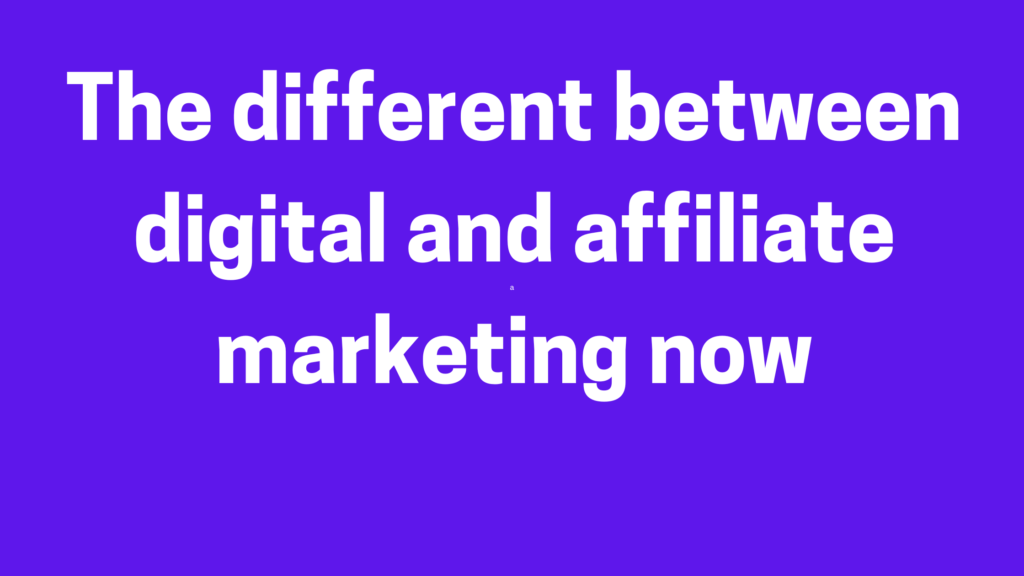
Definition
The difference between digital marketing and affiliate marketing right now. Digital marketing refers to the use of digital channels, platforms, and technologies to promote products, services, or brands to consumers. It encompasses a broad range of marketing activities that utilize the Internet and other digital mediums.
Key Components
- Purpose: Improve website visibility in search engine results.
- Methods: Keyword optimization, on-page SEO, off-page SEO, and technical SEO.
- Content Marketing:
- Purpose: Create and distribute valuable content to attract and engage a target audience.
- Methods: Blog posts, articles, videos, infographics, podcasts, and social media content.
- Social Media Marketing:
- Purpose: Promote brands and products through social media platforms.
- Methods: Organic posts, paid ads, influencer partnerships, and social media management.
- Email Marketing:
- Purpose: Communicate with customers and prospects through email.
- Methods: Newsletters, promotional emails, transactional emails, and drip campaigns.
- Pay-Per-Click (PPC) Advertising:
- Purpose: Drive traffic to websites through paid ads on search engines and other platforms.
- Methods: Google Ads, Bing Ads, social media ads, and display advertising.
- Affiliate Marketing:
- Purpose: Promote products through third-party affiliates.
- Methods: Commission-based partnerships where affiliates earn a commission for sales or leads they generate.
- The difference between digital marketing and affiliate marketing right now. Influencer Marketing:
- Purpose: Leverage influencers to promote products or brands.
- Methods: Paid partnerships, product placements, and sponsored content.
- Online Public Relations (PR):
- Purpose: Manage the online reputation of a brand.
- Methods: Press releases, media outreach, and online reputation management.
- Conversion Rate Optimization (CRO):
- Purpose: Improve the percentage of website visitors who take the desired action.
- Methods: A/B testing, user experience improvements, and analytics-driven adjustments.
The difference between digital marketing and affiliate marketing right now. Advantages
- Global Reach: Ability to reach a vast audience worldwide.
- Cost-Effective: Often more affordable than traditional marketing methods.
- Measurable Results: Easy to track and analyze performance through analytics tools.
- Targeted Campaigns: Ability to target specific demographics, interests, and behaviors.
- Flexibility and Adaptability: Campaigns can be adjusted in real time based on performance data.

Challenges
- High Competition: Digital spaces are crowded, making it hard to stand out.
- Constantly Evolving: Requires staying updated with new trends and technologies.
- Privacy Concerns: Handling user data responsibly and complying with regulations like GDPR.
- Technical Skills Required: Understanding and leveraging various digital tools and platforms.
Affiliate Marketing
Definition
The difference between digital marketing and affiliate marketing. Affiliate marketing is a performance-based marketing strategy where businesses reward affiliates (partners) for driving traffic or sales to their website through the affiliate’s marketing efforts. Affiliates earn a commission for each sale, lead, or action completed by the referred traffic.
The difference between digital marketing and affiliate marketing right now. Key Components
- Affiliates:
- Individuals or companies that promote products or services of a merchant in exchange for commissions.
- Merchants:
- Businesses that create and sell products or services and offer an affiliate program.
- Affiliate Networks:
- Platforms that connect affiliates with merchants and provide tracking, reporting, and payment services (e.g., ShareASale, Commission Junction).
- Consumers:
- End-users who purchase products or services through the affiliate’s promotional efforts.
- Tracking:
- Methods to monitor affiliate-driven traffic and conversions using unique affiliate links, cookies, and analytics tools.
Process
- Affiliate Joins Program: The affiliate signs up for a merchant’s affiliate program, often through an affiliate network.
- Promotion: The affiliate promotes the merchant’s products or services through various channels (websites, blogs, social media, email).
- Referral: Consumers click on affiliate links and are directed to the merchant’s website.
- Conversion: Consumers complete a desired action (purchase, sign-up), tracked by the merchant.
- Commission: The affiliate earns a commission for each successful conversion, paid by the merchant.
Advantages
- Low Risk for Merchants: Payment is based on actual performance (sales or leads).
- Scalable: Merchants can recruit multiple affiliates to expand their reach.
- Cost-Effective: The pay-per-performance model ensures marketing spending is efficient.
- Flexibility for Affiliates: Affiliates can choose which products to promote and how to promote them.
Challenges
- Finding Quality Affiliates: Recruiting affiliates who can effectively drive traffic and conversions.
- Tracking and Attribution: Accurately tracking and attributing conversions to the correct affiliate.
- Compliance and Fraud: Ensuring affiliates adhere to guidelines and preventing fraudulent activities.
- Competition: High competition among affiliates promoting similar products.
The Differences between Digital Marketing and Affiliate Marketing right now
- The difference between digital marketing and affiliate marketing. Scope:
- Digital Marketing: Encompasses a wide range of online marketing activities, including SEO, content marketing, PPC, social media, email marketing, and more.
- Affiliate Marketing: A specific type of digital marketing that involves partnerships where affiliates promote a merchant’s products for commissions.
- Roles:
- Digital Marketing: Involves various roles such as digital marketers, content creators, SEO specialists, social media managers, and PPC experts.
- Affiliate Marketing: Involves merchants, affiliates, and sometimes affiliate networks.
- Payment Model:
- Digital Marketing: Payment models can vary widely, including salary for employees, fixed fees for services, or budgets for paid ads.
- Affiliate Marketing: Predominantly performance-based, with affiliates earning commissions based on sales or leads generated.
- Control and Execution:
- Digital Marketing: Typically controlled and executed by the business or its marketing team.
- Affiliate Marketing: Execution is largely in the hands of affiliates who choose how to promote the products.
- Investment and Risk:
- Digital Marketing: Businesses invest in various marketing activities and assume the risk of ROI on those activities.
- Affiliate Marketing: Lower upfront investment for businesses, with affiliates bearing the risk of their promotional efforts.
- Measurement and Analytics:
- Digital Marketing: Involves comprehensive analytics across multiple channels to measure effectiveness.
- Affiliate Marketing: Focuses on tracking specific affiliate-driven metrics like clicks, conversions, and commissions.
- Strategy and Approach:
- Digital Marketing: Involves a holistic strategy integrating various digital channels to achieve marketing goals.
- Affiliate Marketing: Often a component of a larger digital marketing strategy, focused on leveraging third-party partners for promotion.
The difference between digital marketing and affiliate marketing right now. Conclusion

The difference between digital marketing and affiliate marketing. In summary, while digital marketing and affiliate marketing share similarities in using online platforms to reach consumers, they differ significantly in scope, roles, payment models, control, investment, and strategy. Digital marketing encompasses a broad array of activities designed to promote products and services through various digital channels. In contrast, affiliate marketing is a specific performance-based model where affiliates earn commissions for driving traffic and sales to a merchant’s website. Understanding these distinctions helps businesses effectively allocate resources and develop strategies that align with their marketing goals.



Pingback: What exactly is digital marketing right now? - FADIMU ADEKUNLE
More people are finding there way to the internet everyday. Internet has now become a marketing center